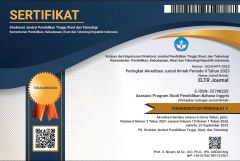THE ANALYSIS OF SPEECH FUNCTIONS USED BY AN ELESP LECTURER IN ENGLISH FOR YOUNG LEARNER CLASS
Abstrak terlihat: 730 / PDF terunduh: 553DOI:
https://doi.org/10.37147/eltr.v1i1.49Keywords:
speech function, English for young learners, metalinguistic functionAbstract
Speech function is a function performed by a speaker which has a purpose to specify their role. It is a situation where a speaker uses certain expression in order to convey some messages effectively. The use of speech function can be beneficial in our lives, especially in teaching learning processes. This research analyzed the speech function used by an English Language Education Study Program (ELESP) lecturer in English for Young Learners class. This study addressed one research question. It was the types of speech function which are used by an English Language Education Study Program of Sanata Dharma University lecturer in English for Young Learners class. The researcher used observation as the instrument to collect the data. Based on the findings, there were six speech functions used by the ELESP lecturer in teaching English for Young Learner class. They were referential function, emotive or expressive function, directive or conative function, phatic function, metalinguistic function, and poetic function. The result of the study revealed that the use of speech function in the classroom depends on the context and situation. Hence, it is not merely a meaningless function, yet it provides a bunch of advantageous for both lecturer and students.
Downloads
References
Tribus, A.C. (2017). The communicative function of language: An exploration of Roman. Jacoboson’s theory in TESOL. SIT Graduate Institute MA thesis. Retrieved from https://digitalcollections.sit.edu/ipp_collection/723/.
Hidayah, N. (2012). The analysis of speech function used by English teacher's instruction at SMPN 6 Salatiga in the academic year of 2011/2012. Salatiga: Islamic Studies Institute (STAIN).
Holmes, J. and N. Wilson. (2017). An introduction to sociolinguistics (5th Ed.). London: Routledge.
Jakobson, R. (1987). Language in literature. Cambridge: The Belknap Press of Harvard University Press.
Jakobson, R. (1985). Metalanguage as a linguistic problem. America: Kulontenyomat Nyevltudomany Kozlemenyek 76.
Ngazizah, E. (2017). The analysis of speech function of teachers’ talk in English classroom of SMAN 5 Purworejo. Purworejo: Purworejo Muhammadiyah University.
Pasaribu, T. (2017). Gender differences and the use of metadiscourse markers in writing essays. International Journal of Humanity Studies, 1(1). 1-13
Pasaribu, T.& Kadarisman, E. (2016). Coding logical mechanism and stereotyping in gender cyber humours. A Journal of Culture, English Language Teaching & Literature,16, pp. 22-48. doi:10.24167/celt.v16i1.485
Rina. (2016). An analysis of speech function used by English teachers at SMP Negeri 10 Kendari. Kendari: Halu Oleo University.
Yuliana. (2016). The Analysis of Speech Function Used by English Teachers at SMAN 5 Kendari. Kendari: Halu Oleo University
Downloads
Published
How to Cite
Issue
Section
License
Copyright (c) 2017 Yoannes Bosco Candrasuryya Mahendra, Felix Novaldy Zulham

This work is licensed under a Creative Commons Attribution-ShareAlike 4.0 International License.











 ELTR Journal,
ELTR Journal, 